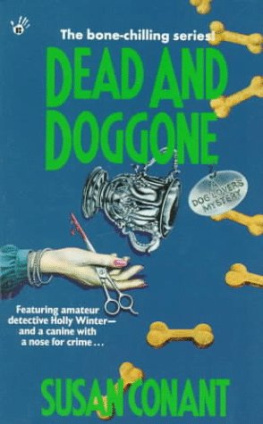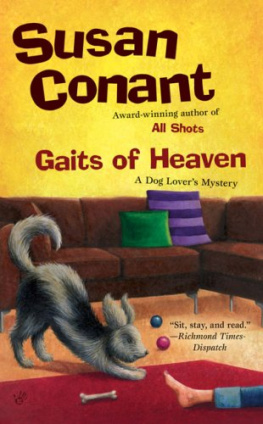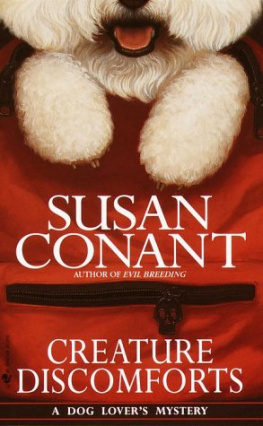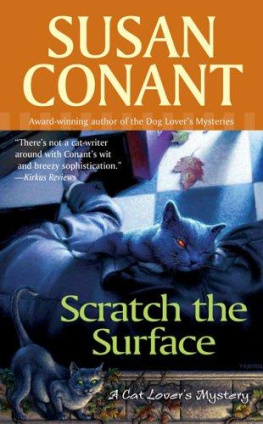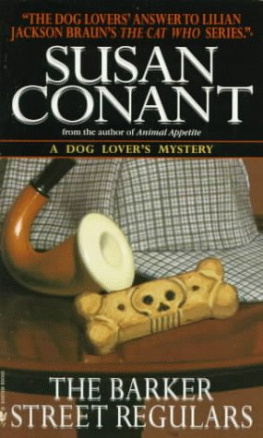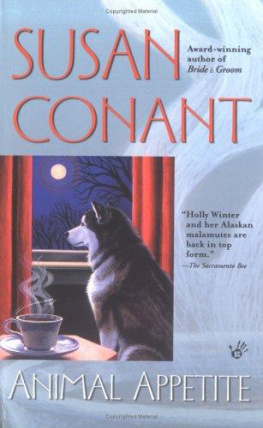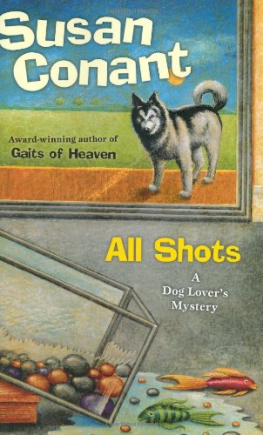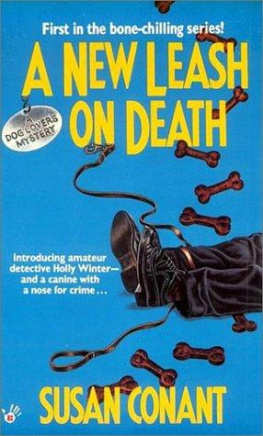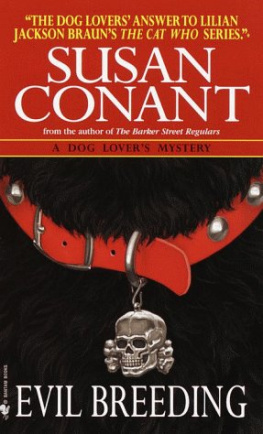Susan Conant - Dead and Doggone
Here you can read online Susan Conant - Dead and Doggone full text of the book (entire story) in english for free. Download pdf and epub, get meaning, cover and reviews about this ebook. year: 1994, publisher: Berkley, genre: Detective and thriller. Description of the work, (preface) as well as reviews are available. Best literature library LitArk.com created for fans of good reading and offers a wide selection of genres:
Romance novel
Science fiction
Adventure
Detective
Science
History
Home and family
Prose
Art
Politics
Computer
Non-fiction
Religion
Business
Children
Humor
Choose a favorite category and find really read worthwhile books. Enjoy immersion in the world of imagination, feel the emotions of the characters or learn something new for yourself, make an fascinating discovery.
- Book:Dead and Doggone
- Author:
- Publisher:Berkley
- Genre:
- Year:1994
- Rating:4 / 5
- Favourites:Add to favourites
- Your mark:
- 80
- 1
- 2
- 3
- 4
- 5
Dead and Doggone: summary, description and annotation
We offer to read an annotation, description, summary or preface (depends on what the author of the book "Dead and Doggone" wrote himself). If you haven't found the necessary information about the book — write in the comments, we will try to find it.
Dead and Doggone — read online for free the complete book (whole text) full work
Below is the text of the book, divided by pages. System saving the place of the last page read, allows you to conveniently read the book "Dead and Doggone" online for free, without having to search again every time where you left off. Put a bookmark, and you can go to the page where you finished reading at any time.
Font size:
Interval:
Bookmark:
DEAD AND DOGGONE
SUSAN CONANT
For my mother, Dorothy Morrison Conant, and in memory of two pointers, Jocks Great Stuff and Jocks Little Nonsense, my Stuffy and my Nonny, with love from the one-pup litter.
In acknowledging the generous help of the Committee for Responsible Research in Cambridge, Massachusetts, I must emphasize that the animal rights group in this book is not modeled on any real organization. All places and institutions in this book are fictional or used fictionally, and all characters are entirely imaginary.
Many thanks to Jan Dale, expert groomer, and to Joel Woolfson, D.V.M., for help with this book. Any errors in grooming and veterinary matters are mine alone. I am also grateful for the assistance of one of Dr. Woolfsons patients, my Alaskan malamute, Frostfield Arctic Natasha, C.D., my incarnate muse.
My name is Holly Winter. It could be worse. Buck and Marissa were counting on a boy. They had the name all picked out; Depth of Winter, to be called Dep. Any normal parents might have had second thoughts about sticking a kid with of for a middle name, but lots of Marissas golden retrievers had it Buddy, Susie, and Ren were all of Winterland and the dogs had never objected, so I suppose my parents, or, as they always said, my sire and dam, didnt think a person would mind, either.
Its also possible that Marissa, who had a more advanced human social sense than Buck does, foresaw that the kids at school might laugh at somebody with the middle name of. My own name isnt quite so embarrassing, but its bad enough. Im sure that Marissa didnt mean it to sound funny. She was a kind person. Even though I lost her eight years ago, I still miss her all the time. In his own way, Buck is gentle and sweet and even a bit shy, which is, I think, why he started breeding wolf hybrids when he got so lonely right after my mother died.
Or maybe the only reason I escaped a worse name is that I was the third litter in a row nine goldens in the first, eight in the second and my parents had used up their current stock of stellar names. Or maybe they were so amazed and disappointed at having produced only a human one-pup litter that they didnt bother thinking up a better name.
Thats probably not true, though. In fact, Marissa used to claim that my father was so delighted with me that he tried to register me with the American Kennel Club. I think she was joking, but it is true that as soon as Buck adjusted to the strange way I barked, he was proud of me. He was been ever since. I can tell. When I got my B.A. in journalism, he started addressing my mail to Holly Winter, U.D., which, in case you didnt know, is an advanced obedience title, Utility Dog, and Bucks idea of a compliment.
Even so, ever since I moved to Cambridge and declined his offer to share the house in Maine with him and his wolf dogs hes been a little hurt. When he feels hurt, he can act petty. For instance, he never admits to reading Dogs Life, but I know he subscribes, and I know hes still sore at me because after every issue comes out, he finds a way to correct some tiny error in my column. Admittedly, he knows more about dogs than I do. He knows more about dogs than any other person Ive ever met, except my mother, but what hell let me know he noticed is always trivial. In a column that came out a couple of months ago, I called a C.D., Companion Dog, a degree. Not a week after that issue came out, Buck and I just happened to have a conversation in which he used the phrase obedience title thirty or forty times with a heavy emphasis on title. You wont find the word degree in the American Kennel Club Obedience Regulations, but so what?
Thats precisely what you could have pointed out to your father, Rita told me. Shes my second-floor tenant. She also called him a master of indirect communication. Cambridge psychotherapists talk like that. Ive explained to her that Bucks indirect communication cant be so bad because I always understand what he means even though someone else might not. Rita just nods and says, Thats whats wrong with it. Even though Rita is very good to her dachshund, Groucho, she can sometimes be an enigmatic know-it-all when it comes to people. And Buck isnt all that indirect. For instance, last Christmas, when he tied a red ribbon on one of his wolf dog pups and left it under the tree, where it chewed up five of its fellow presents, it just meant that he hated to think of his thirty-year-old daughter living alone in the city with only one dog. Thats what I was more or less down to at the moment.
More or less? As I told Buck, if the average Alaskan malamute equaled five or ten other dogs in strength, IQ, and looks, Rowdy equaled at least two or three other malamutes. To me, I added, he was worth the endowment of my neighborhood school, a place called Harvard, and when it came to brains, he was better endowed than most of the faculty. So I needed a big dog? Mine weighed eighty-five pounds of muscle, I reminded my father. And beautiful? His coat shone silvery gray and white, and I like his face, an open face, no dark marking on his muzzle and no black mask around his eyes, which, as I reminded Buck, were that very dark brown eyes thats so desirable in malamutes. If he has blue eyes, turn them brown. Shape them like almonds round the tips of his ears and set them wide apart on his head. Give him an even plumier white tail, an even pinker tongue, and an even bigger smile than he needs, and hell look like Rowdy, not, incidentally, his real name, which I didnt pick. I didnt pick the name Rowdy, either, even though it suited him. By the time I got him, he responded to it, but thats another story.
This one started with a dog fight that broke out on Walden Street in front of Quigley Drugs, only a few blocks from my house, which is the red one at the corner of Appleton and Concord. Id walked rowdy past Quigley Drugs before, and the place had always worried me. It looked like a regular house, but you could tell it was a drugstore because over the front door hung a tilted sign positioned to crash on any customer who opened or closed the door. Since the sign had hung like that for years, Id always assumed that no one had ever gone in or out.
Even before the day of the fight, I knew from the barks that erupted whenever I walked Rowdy by the store that there were dogs at Quigley Drugs, but I hadnt realized that they were in fact the magnificent pointers who showed up at dog training with their rather odd owners once every few months. I should have guessed. The Cambridge Dog Training Club meets at the armory on Concord Avenue, and Id noticed that the pointers and their handlers walked home after class. The connection came to me as soon as I saw the woman standing in front of the store, on the cracked, weedy blacktop where youd expect a front lawn to be.
The lights at the armory turn everyone a greenish purple, but spring sunlight didnt flatter her, either. She was a scrawny little thing somewhere between forty and seventy, cracked and weedy like the blacktop, with great folds of Shar Pei wrinkles dripping from the bones of her arms. When we got nearer to her, I could see what looked like a mask was at least a quarter inch of suntan-colored foundation makeup. The fuchsia ringlets on her head must have been a wig. She wore an oversize pink baby dress and a pair of open-toed sling-back high heels that matched the dress and clashed with the hair. A cork-tipped cigarette dangled form her lips, and coral lipstick filled the cracks around them.
Come, Max! she was screeching. Come to Mama! Here, Max!
If shed shown up at dog training every week, shed have learned to say his name first, then the command: Max, come. It didnt seem to matter to Rowdy, however; he was fascinated. When he dragged me to within a few yards of her and was about to introduce himself, across Walden Street bounded the errant Max, a lithe black and white pointer with a good head and a long, fluid stride.
Next pageFont size:
Interval:
Bookmark:
Similar books «Dead and Doggone»
Look at similar books to Dead and Doggone. We have selected literature similar in name and meaning in the hope of providing readers with more options to find new, interesting, not yet read works.
Discussion, reviews of the book Dead and Doggone and just readers' own opinions. Leave your comments, write what you think about the work, its meaning or the main characters. Specify what exactly you liked and what you didn't like, and why you think so.

